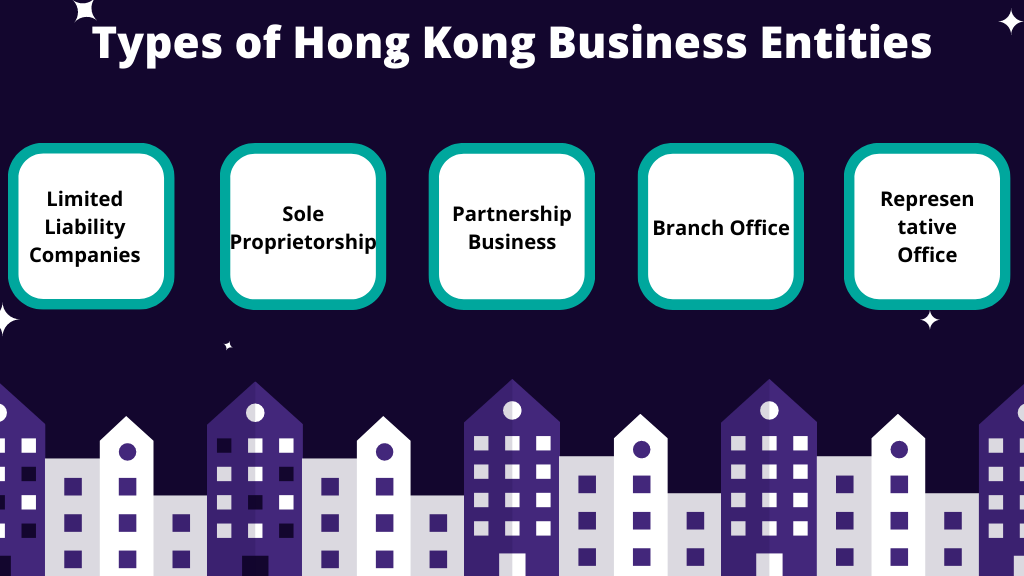
An Introduction to Types of Hong Kong Business Entities
Table of Contents
Hong Kong is a globally accepted region for setting up a business, and we all know that the statistical ranking shows that it is a dream place for investors. Setting up a business in an exceptional place is always the priority of business people. It is great to have a ranked business region to set up your businesses but finding a good business place is not enough; further information about the marketing research and business scope also matters.
Suppose that you entered the Hong Kong market, but you are blank and don’t know anything about the business entities there. So it would be challenging for a newcomer to adjust there and run up businesses as it requires proper knowledge about the Hong Kong stock exchange market.
So to found a great business place is not enough, but the proper knowledge about marketing research and trends is all that matters.
This article will find out the types of business entities and select accordingly. The most common type of business entity is a private company limited liability. The advantages and disadvantages of selecting one will also help you choose one according to your requirements.
Types of business entities in Hong Kong;
Undoubtedly, Hong Kong is an exceptional place to run a business. To set up a business in place also requires knowledge about the market’s competition. As there are several types of business entities, the pros and cons of those companies can help you get the effective one.
Before incorporating a company in Hong Kong by registering with companies’ registry, you must ask yourself your target market, the liability of your business, its scope purposes, and status in marketing research. Knowing these answers can help you choose the right business entity according to your business type.

In Hong Kong, business entities are mainly described as private and public company, but it further includes;
- limited liability companies in Hong Kong
- sole proprietorship in Hong Kong
- partnership business
- branch office in Hong Kong
- representative office in Hong Kong
1- Limited liability companies;
The most common business entity registered in Hong Kong is limited liability companies. Limited companies have a separate legal entity, strong and autonomous structure. Its structure is endurable and easier than other types of business entities in Hong Kong. This type is comprised of three further types;
- Private company
- Public company
- Shares public limited liability company
- Guarantee public limited liability company
Private limited liability Company;
It is the most common and best type for small to medium-sized businesses in Hong Kong. It is a limited and personally liable company with its separate legal entity. This feature applies to both mainland China and Hong Kong. However, some rules are to follow while incorporating this company by companies’ registry.
- A company limited by shares has a share capital divided into several shares of each value.
- no minimum share capital
- maximum shareholders can be 50
There can be one or multiple company secretaries; the sole director cannot be the company secretary.
Advantages and disadvantages;
The main advantages of incorporating a private company are;
- A private company has its legal entity. It has a strong structure with autonomous nature.
- a private company can be incorporated in a single day
- There is no restriction on capital; you can generate more capital by hiring more than one person up to 50.
- there is no profits tax, the key feature of private company
- Private companies are more honest and liable than other types in Hong Kong. It has a positive image in the market.
- Many companies face issues while transferring their ownership, but private limited companies provide the easy complete or partial transfer.
- the cons of incorporating a private limited company;
- Opening a private limited company is more expensive than another type of business. It is more complex than a partnership business.
- Closing a private limited company is also complex; it is more time-consuming and costly than other businesses.
- The disclosure of shareholders and employees is required in private limited companies. The owner has to share the profiles of shareholders and company officers with the Hong Kong companies’ registry.
Public limited liability Company;
This type is not limited to constricted shareholders. It allows more than 50 shareholders that private limited company. This company can be incorporated in Hong Kong by a company’s registry, responsible for registering local companies and companies incorporated outside. Or it is easy to incorporate the company by registration with the business registration office. Only a business registration office can make it quick and easy for you.
Advantages and disadvantages of public limited liability company;
The main advantages of a private limited company are;
- The public limited company generates more share capital than the private limited company comparatively. A public company provides more opportunities to expand its share than other business entity types. In a sense, it is a platform mainly allocated for public enhancement. It takes more care of the shareholders than other types of business.
- A public company has a strong social perception.
- The disadvantages are;
- The closing of a public company is complex, time-consuming, and expensive.
The public limited company by shares;
A public company limited by shares is a locally incorporated company in which the number of shareholders can be more than 50. A public company is one where shares and opportunities are offered to the public.
The public limited company by guarantee;
- Societies, clubs, and organizations prefer this type of business. The purpose is to raise funds for the human cause.
- this type of company is limited by guarantee; it does not have shared capital
- It requires only one or two directors, the company secretary, and the registered office.
- The company’s shareholders can be more than 50, and the shares are not divided into the shareholders while they are supplied to the event manager for the organization’s events.
2- Sole proprietorships in Hong Kong;
in this type, the company is owned by only one person. The loss and profit are liable to only one person. It is the basic level to enter the Hong Kong stock exchange market.
Advantages of sole proprietorships
- The registration and maintenance process is easy and quick. Suppose you want to register a new Hong Kong company or sole proprietorship. You must apply for the business registration certificate of the sole proprietor with the Hong Kong inland revenue department.
- Managing and making decisions is super easy as it is one owner company.
- All the profits are liable to only one person.
Disadvantages of sole proprietorships
- The single-owner company may suffer from a limited source of finance because the company is limited to only one person’s wealth.
- It is a risky business because of unlimited personal liability.
- Businesses can only transfer by the sale of business assets.
- The business owner has to face the hurdles alone.
3- Partnership business in Hong Kong;
Under the Hong Kong companies ordinance, a partnership is developed when one collaborates with another person to do business, having a shared intention for profits. There should be an agreement between the partners.
- This type is regulated in two manners;
- One type is a general partnership involving two or more partners. A general partner is responsible for the actions of others.
Another type is a limited partnership which is constricted to only two participants
According to the partnership ordinance in Hong Kong, all the partners should have a mutual argument.
Advantages
- It is much easier and quicker to establish this business than registering a company. It is also extremely flexible in terms of the partnership.
- It is easy to generate shared capital than any other business entity.
The disadvantages are:
- In a general partnership, all the partners are liable for loss and profits, so generating profits is not easy.
- Due to limited liability in limited partnership also lost the profit margin
4- Branch or representative office in Hong Kong;
Foreign companies register an office to raise capital and extension of the business. The purpose is to generate profits via commercials. It does not have its legal entity and system, but it is responsible to the parent company.
Frequently Asked Questions
Is there LLC in Hong Kong?
It is necessary to have at least one shareholder, a director, and a secretary if one wishes to open an LLC in Hong Kong. In this type of company, there is no residency requirement for shareholders, and the maximum number of shareholders is 50.
Is a Hong Kong limited company a corporation?
In Hong Kong, a limited liability company has its legal identity separate from its members. A limited liability company can be a good choice for a small business, a medium-sized business, or a large corporation, depending on its type.
Conclusion;
Do you want to set up a new company in Hong Kong but not decide on the business entity? Well, not to worry about it. Hopefully, the abovementioned entity description and its pros and cons can help you select the business entity type according to your interests.
